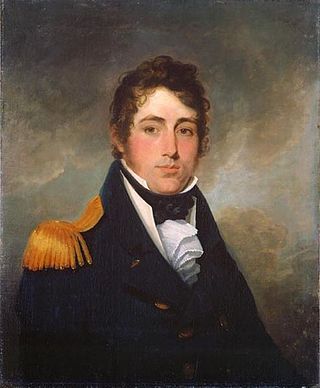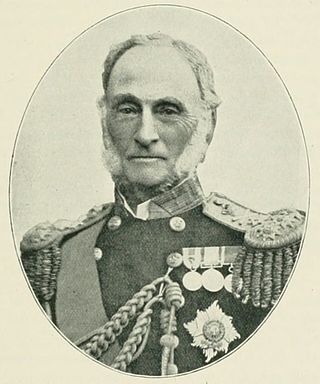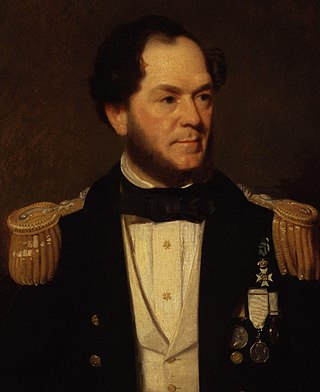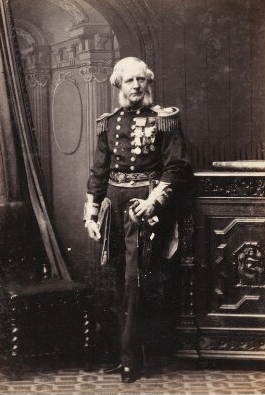
Admiral of the Fleet is a five-star naval officer rank and the highest rank of the Royal Navy, formally established in 1688. The five-star NATO rank code is OF-10, equivalent to a field marshal in the British Army or a Marshal of the Royal Air Force. Apart from honorary appointments, no new admirals of the fleet have been named since 1995, and no honorary appointments have been made since 2014.

Admiral of the Fleet Sir Provo William Parry Wallis, was a Royal Navy officer. As a junior officer, following the capture of USS Chesapeake by the frigate HMS Shannon during the War of 1812, the wounding of HMS Shannon's captain and the death of her first lieutenant in the action, he served as the temporary captain of HMS Shannon as she returned to Halifax, Nova Scotia, with Chesapeake.

Colonel Aylmer Spicer Cameron was a British Army officer and recipient of the Victoria Cross, the highest and most prestigious award for gallantry in the face of the enemy that can be awarded to British and Commonwealth forces.

Admiral of the Fleet Sir Geoffrey Thomas Phipps Hornby GCB was a Royal Navy officer. As a junior officer, he saw action at the capture of Acre in November 1840 during the Egyptian–Ottoman War. As a captain, he was assigned to Vancouver Island with a naval brigade where he found a unit of United States troops ready to take over the San Juan Islands in a dispute that became known as the Pig War. Hornby used his powers of diplomacy to facilitate a peaceful handover of the islands to the United States.
Admiral Sir William Fanshawe Martin, 4th Baronet,, was a Royal Navy officer. As a commander, he provided valuable support to British merchants at Callao in Peru in the early 1820s during the Peruvian War of Independence. He became First Naval Lord in the Second Derby–Disraeli ministry in March 1858 and in that capacity acted as a strong advocate for the procurement of Britain's first ironclad warship. He went on to be Commander-in-Chief, Mediterranean Fleet and in that role provided important assistance during the Italian disturbances in 1860 and 1861, reformed the system of discipline in his fleet and developed a comprehensive system of manoeuvres for steam ships.

Admiral of the Fleet Sir William Parker, 1st Baronet, GCB, was a Royal Navy officer. As a captain's servant he took part in the Battle of The Glorious First of June in June 1794 during the French Revolutionary Wars and, as a captain, he participated in the capture of the French ships Marengo and Belle Poule at the action of 13 March 1806 during the Napoleonic Wars. He was detached on an independent command on the Tagus in September 1831 with a mission to protect British interests during the Portuguese Civil War. As Commander-in-chief of the East Indies and China Station, he provided naval support at various actions between 1841 and 1842 during the First Opium War. Appointed Commander-in-Chief, Mediterranean Fleet in February 1845, he was briefly First Naval Lord in the First Russell ministry from 13 July 1846 to 24 July 1846 but gave up the role due to ill health before returning to his command with the Mediterranean Fleet.

Admiral Sir Anthony Hiley Hoskins, was a Royal Navy officer. As a junior officer, he took part in the Cape Frontier War of 1851 and then saw action at the Battle of Canton in December 1857 and the Battle of Taku Forts in May 1858 during Second Opium War. Once promoted to flag officer rank, he acted as Second-in-Command of the Fleet at the bombardment of Alexandria in July 1882 during the Anglo-Egyptian War. He went on to be First Naval Lord in September 1891 but in that role took a relaxed view of the size of the Fleet and did not see the need for a large shipbuilding effort on the scale envisaged by some of his colleagues, such as Admiral Sir Frederick Richards and Admiral Sir John Fisher who were concerned about French and German naval expansion.

Admiral Sir Sydney Colpoys Dacres, was an officer of the Royal Navy who saw service during the Greek War of Independence, when he was involved in an attack on the Turkish forces at Morea, and later during the Crimean War. Born into a substantial naval dynasty during the Napoleonic Wars, he eventually rose to the rank of Admiral and became First Naval Lord. His only significant action as First Naval Lord was to press for the abolition of masts. He went on to be Visitor and Governor of Greenwich Hospital.

Sir Henry Frederick Stephenson was a Royal Navy officer, courtier, and Arctic explorer.

Sir Erasmus Ommanney was a Royal Navy officer and an Arctic explorer of the Victorian era.

Vice-Admiral George Fowler Hastings CB was an officer of the Royal Navy, who saw service during the First Opium War and the Crimean War. In a naval career spanning over 50 years Hastings saw service across the British Empire, and rose to the rank of vice-admiral. His service as commander in chief on the Pacific Station of the Royal Navy at Esquimalt on the British Columbia Coast of what is now Canada is today commemorated in the names of several locations and geographic features.

Admiral of the Fleet Sir Alfred Phillipps Ryder was a Royal Navy officer. As a junior officer he undertook the role of transporting Pedro de Sousa Holstein, 1st Duke of Palmela, the Portuguese ambassador, back home to Lisbon and then delivering the Percy Doyle, the British ambassador to the Republic of Mexico, to Mexico City. He then led a naval brigade dispatched to Nicaragua to deal with the unlawful detention of two British subjects. He pursued the Nicaraguan commander, a Colonel Salas, for 30 miles up the San Juan River and captured the fort at Serapique.

Admiral Pelham Aldrich was a Royal Navy officer and explorer, who became Admiral Superintendent of Portsmouth Docks.

Admiral Sir William Robert Kennedy was a Royal Navy officer who served as Commander-in-Chief, The Nore.
Admiral Frederick Byng Montresor was a Royal Navy officer who went on to be Commander-in-Chief, East Indies & Cape of Good Hope Station.

General Sir Fortescue Graham was a senior Royal Marines officer, serving for 62 years and seeing active service in the Napoleonic, Peninsular, and War of 1812, and later in Spain, China, and the Baltic campaign 1854.
Admiral Sir George Digby Morant was an Anglo-Irish admiral in the British Royal Navy.

Admiral Sir George Nathaniel Broke-Middleton, 3rd Baronet CB was a British Royal Navy officer.
Admiral William Hotham, KH was a British Royal Navy officer.
Rear-Admiral Sir Malcolm Murray-Macgregor of Macgregor, 4th Baronet, JP was a Scottish baronet and senior Royal Navy officer.















